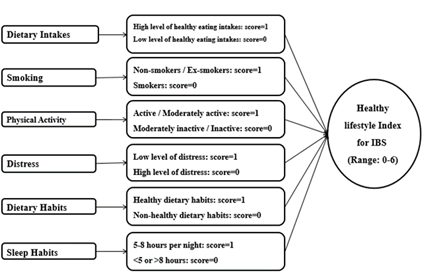- Submissions

Full Text
Gastroenterology Medicine & Research
A Combined Healthy Lifestyle Index in Assessing the Relationship with Irritable Bowel Syndrome: Better Prediction of the Disorder
Parvane Saneei* and Ahmad Esmaillzadeh
Department of Community Nutrition, Iran
*Corresponding author:Parvane Saneei, Department of Community Nutrition, School of Nutrition and Food Science, Isfahan, Iran
Submission: May 6, 2019;Published: July 18, 2019

ISSN 2637-7632Volume3 Issue3
Opinion
Irritable Bowel Syndrome (IBS) is one of the most common gastrointestinal disorders worldwide. Symptoms of IBS include chronic or recurrent abdominal pain or discomfort associated with abnormal bowel habit [1]. IBS was prevalent approximately in 10-15% of different population groups and was found predominantly in women [2]. Several important factors are involved in etiology of IBS including disrupted gut microbiota function, immunological dysfunction, food intolerance, altered gut motility, psychological distress factors and genetic predisposition. Several investigations have evaluated the relationship between lifestyle-related factors and IBS. Numerous modifiable risk factors, including poor dietary intakes, physical inactivity, smoking, having high level of distress and obesity, have been studied in association with the disorder; however, findings were conflicting. For example, in an internet survey of general population in Japan, positive relationships were found between physical inactivity, insufficient sleep, meals irregularly, insufficient intake of vegetable and meat and being highly susceptible to stress, as independent predictors, with IBS symptoms [3]. However, smoking -as a risk factor for IBS- was not taken into account in that study. Another survey has also documented that children with IBS were susceptible to stress and had impaired sleep and eating habits [4]. In Lebanese adults, being water pipe smoker and alcohol consumer were associated with a higher prevalence of IBS; while cigarettes smoking, and physical exercise were not significantly associated with IBS occurrence [5]. Individuals with IBS in London habitually had more intake of sodium and low intake of fiber, selenium and iodine, as well as having low scores for diet quality [6]. However, a cross-sectional study among IBS patients in the United Kingdom showed that the balance of energy macronutrients was favorable, intakes of selected micronutrients significantly exceeded the reference nutrient intakes [7]. Another investigation in Sweden found the same results in IBS patients compared with control group from a nation-wide dietary survey [8]. Most of these studies have focused on the relation of a certain behavior, rather than all lifestyle factors, and IBS; the benefits of considering multiple components of a healthy lifestyle have not studied. As shown in Figure 1, an overall healthy lifestyle index that incorporates more than one of lifestyle-related factors can be more effective in predicting the risk for IBS than any single factor.
Figure 1:A flow chart for developing a healthy lifestyle index for irritable bowel syndrome.

References
© 2019 Parvane Saneei. This is an open access article distributed under the terms of the Creative Commons Attribution License , which permits unrestricted use, distribution, and build upon your work non-commercially.
 a Creative Commons Attribution 4.0 International License. Based on a work at www.crimsonpublishers.com.
Best viewed in
a Creative Commons Attribution 4.0 International License. Based on a work at www.crimsonpublishers.com.
Best viewed in 







.jpg)






























 Editorial Board Registrations
Editorial Board Registrations Submit your Article
Submit your Article Refer a Friend
Refer a Friend Advertise With Us
Advertise With Us
.jpg)






.jpg)














.bmp)
.jpg)
.png)
.jpg)










.jpg)






.png)

.png)



.png)






